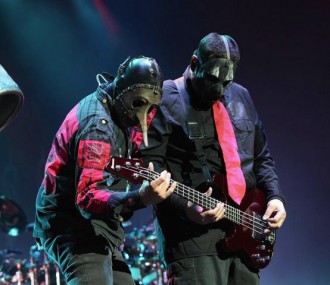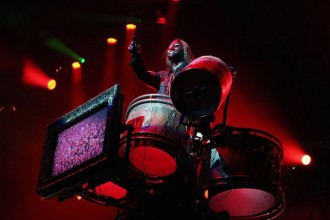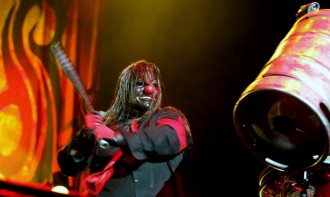Corey Taylor Interview 2009
Photo Ronn Dunnett
“It gave us more time and energy to experiment in the studio. I was able to come up with more guitar sounds than ever,” says Root.
While the heart of Slipknot remains its music, its soul is planted firmly on stage. Today, Slipknot are playing in sold-out arenas, but the band developed their talents by slogging it out in the Midwest, playing any show they could find. These were frequently one-off shows; the band would travel from their hometown of Des Moines to places like Omaha and Chicago. “There were never any actual tours in those days,” says Thomson. “Our shows were like sporting events: We’d put everything into them and then afterwards, we’d be fucking exhausted. We
weren’t going to pile into a van - all nine of us - and then drive all night to the next show. We’d have fallen asleep at the wheel and died.”
“Those early shows were rough, but I loved the small stage,” says Gray. “There was something intimate about it. It was like an old-school punk show, which is what I grew up with.”
“I don’t miss that shit at all,” disagrees Thomson. “It was 8,000 degrees, you’re bumping into people, you’re tripping over equipment. Those small stages have low ceilings, so the heat’s trapped real low - right at your head. Those shows are about survival, not about playing.”
Photo Ronn Dunnett
As difficult as those early shows were for the band, they were just as challenging for whoever might be standing in the front row.
“Shawn used to bring chop saws on stage to grind pipes for sparks,” remembers Thomson. “Once, a chunk broke off and sent a kid to the hospital. But people who got hurt at our shows were cool about it - we’d follow them to the hospital and sign some shirts and shit. It was like, you know, no harm, no foul.”
“Everyone tried to control us, though,” says Taylor.
“Yeah, those fuckers,” says Thomson. “We’d be on tour and fire marshals would show up with camcorders and accuse us of all kinds of crazy bullshit. They’d say, ‘We heard you set yourselves on fire.’
“Well… okay, we’d done that!” Thomson continues, laughing. “Sid and Clown would spray each other with lighter fluid and then they’d pull out lighters. That got us in trouble. One promoter would call the next - they’d warn each other and they’d hit us with ‘do not’ lists. We were castrated.”
Surviving for 10 years is an accomplishment for any band. With Slipknot, it feels like some sort of miracle. Personalities frequently collide, side-projects abound, and on-stage fights are common. And yet, year after year, album after album, all nine men keep coming back for more. “We’re banded together in hate,” says Jordison. “Sometimes we hate each other, sometimes we hate the world, sometimes we just hate our own
lives. But when we get together, something monstrous happens and we pull this amazing sound out of all that energy.
Photo Ronn Dunnett
“Plus,” he adds, “we believe in world domination, and this is the band that’s gonna get us there.”
“You know, we went from being some local band in a basement to selling millions of records,” says Gray. “It’s going to be a decade since the first album came out. I’m so happy and amazed and proud and thankful for where this band has gone. I’ve gotten to see the world - and I get paid for it! I’d have done it for free.”
Chris Fehn agrees. “I think the best part about being in this band has been getting exposure to the rest of the world. You realize that everything in the world is the same - people feel the same, they have the same desires, hopes, fears. Being worldly is a gift that I don’t ever want to give back. It changes your life - especially when you’re from a small town in Iowa.”
“I always knew we’d go far. I just knew it,” says Taylor. “There was no way this band was going to fail. But I never knew we’d reach the heights we’ve come to. We’ve traveled the world so many times; all the different countries are like our second homes. To this day, it still blows me away that we took this crazy idea and made it a global sensation.” Slipknot singer Corey Taylor knew his band was destined for greatness. He also knew that it wouldn’t come easy. “When we were starting out, we had all these strikes against us,” he says. “We were from Iowa, there were nine of us, we wore masks, we wore coveralls, we played metal. Hard metal.”
“It was tough getting people to come out to Des Moines,” adds bassist Paul Gray. “I don’t know why, it’s a pretty cool place. But A&R dudes - jaded folks from Los Angeles or New York - it’s hard to get them to come to Iowa.”
“And then there were all the haters,” says Taylor.
Ah, the haters. The people who liked nothing more than to give the band flack for its look, for substituting numbers for names, for putting on a show full of over-the-top chaos and unmitigated mayhem. Some of the comments came from the usual assortment of web sites and so-called music critics. But, surprisingly, “we also took a lot of shit from other bands,” says guitarist James Root. “When we hit the road with Ozzfest in 1999, I heard a lot of condescending remarks from other musicians. They were saying, ‘Slipknot won’t sell enough records, they won’t survive, they’ve got too many people, nobody’s gonna get it, they’re all about image.’ ”
|
|

|
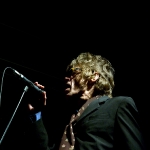
New York Dolls |
LATEST GALLERY IMAGES
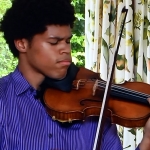
The Kanneh-Masons 
Sting 2025 |
|
|


